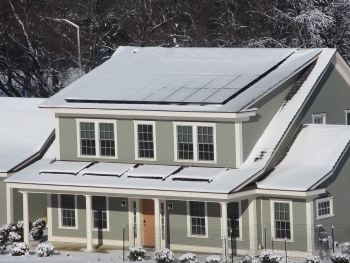Jul012014
Posted at 2:00 PM
The net-zero energy test house at the National Institute of Standards and Technology (NIST) in suburban Washington, D.C., not only absorbed winter's best shot, it came out on top, reaching its one-year anniversary on July 1 with enough surplus energy to power an electric car for about 1,440 miles.*
The 2,700 square-foot (252-square-meter) test house is built to U.S. Green Building Council LEED Platinum standards—the highest standard for sustainable structures. Its features include energy-efficient construction and appliances, as well as energy-generating technologies, such as solar water heating and a solar photovoltaic system.
Despite 38 days when the test house's solar panels were covered with snow or ice, the Net-Zero Energy Residential Test Facility's (NZERTF) sun-powered generation system produced 13,577 kilowatt hours of energy. That's 491 kilowatt hours more than used by the house and its occupants, a computer-simulated family of two working parents and two children, ages 8 and 14.
In terms of energy consumed per unit of living space—a measure of energy-use intensity—the NIST test house is calculated to be almost 70 percent more efficient than the average house in Washington, D.C., and nearby states.
In relation to cost, the NZERTF's virtual residents saved $4,373 in electricity payments, or $364 a month. However, front-end costs for solar panels, added insulation, triple-paned windows, and other technologies and upgrades aimed at achieving net-zero energy performance are sizable, according to an analysis by NIST economist Joshua Kneifel.
In all, Kneifel estimates that incorporating all of the NZERTF's energy-related technologies and efficiency-enhancing construction improvements would add about $162,700 to the price of a similar house built to comply with Maryland's state building code.
Planned measurement-related research at the NZERTF will yield knowledge and tools to help trim this cost difference. Results also will be helpful in identifying affordable measures that will be most effective in reducing energy consumption. And research will further the development of tests and standards that are reliable benchmarks of energy efficiency and environmental performance overall, providing information useful to builders, home buyers, regulators and others.
![]()

